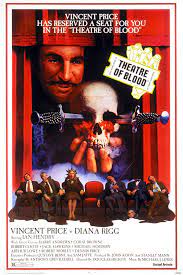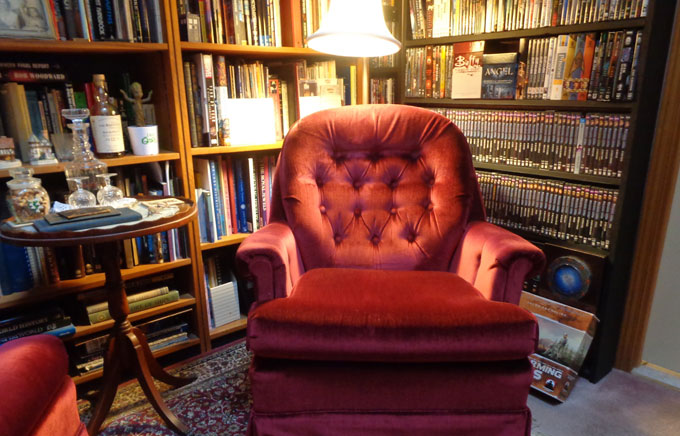
After being humiliated by the Theatre Critic’s Guild at an awards ceremony, Shakespearean actor Edward Lionheart (Vincent Price) attempts to commit suicide by diving into the River Thames. But he survives and is rescued by a group of vagrants. Two years later, at the Ides of March, Lionheart begins to exact vengeance against the critics who failed to recognize his genius. He kills them one at a time, their deaths inspired by the murder scenes in Shakespeare’s plays. Before each murder, he reads out the damning review of that critic.
The first victim is George Maxwell (Michael Hordern), who is stabbed by Lionheart’s mob of vagrants as was Julius Caesar in the play of that name. Second, Hector Snipe (Dennis Price) is impaled with a spear and dragged away, tied to a horse’s tail, like Hector in Troilus and Cressida. The third, Horace Sprout (Arthur Lowe), is decapitated while sleeping like Cloton in Cymbeline. The fourth, Trevor Dickman (Harris Andrews) has his heart cut out by Lionheart dressed as Shylock in The Merchant of Venice) as if Antonio were forced to pay his debt that way. The fifth, Oliver Larding (Robert Coote), is drowned in a barrel of wine like the Duke of Clarence in Richard III.
Lionheart lures the critic Peregrine Devlin (Ian Hendry) to a gymnasium used for fencing, where Lionheart badly wounds him in a re-enaction of the swordfight in the street from Romeo and Juliet. He does not, however, kill Devlin at this time. The sixth critic, Solomon Psaltery (Jack Hawkins), is obsessively jealous, murdering his wife Maisie (Diana Dors) in the belief, at Lionheart’s instigation, that she is unfaithful, as in Othello. Psaltery himself survives but will die in prison. The seventh critic, Miss Chloe Moon (Coral Browne) is electrocuted, reproducing the burning of Joan of Arc in Henry VI, Part One. The eighth critic, a flamboyant gourmand named Meredith Merridew (Robert Morley), is force-fed pies made from his dogs until he chokes to death like Queen Tamora in Titus Andronicus.
Throughout, Lionheart is helped by his devoted daughter Edwina (Diana Rigg). When she is arrested for the murders, Lionheart is forced to reveal himself. He tells Devlin to give him the award he covets or die, but Devlin refuses and Lionheart intends to put out his eyes with daggers as befell Gloucester in King Lear. But the device Lionheart built gets stuck just as the police arrive. Lionheart sets fire to the theatre. In the struggle, one of the vagrants accidentally kills Edwina with the award statue like Cordelia, Lear’s daughter. Lionheart carries her body to the roof and recites Lear’s final monologue before the roof collapses. Devlin critiques his performance.
The film was directed by Douglas Hickox and written by Anthony Greville-Bell, Stanley Mann, and John Kohn. It was originally to be entitled Much Ado About Murder. It was offered to Robert Furst, Director of the Doctor Phibes films, but he didn’t want to be known as the director of Vincent Price killing sprees. Hickox was thrilled with the cast of brilliant actors, and the whole film was perfect for Price, who got to recite the great Shakespearean soliloquies while murdering critics. What actor wouldn’t want that? Of course, it was Price’s favorite of his films. It was well received by critics as well. (Were they in fear of their lives?) The British Theatre Company called Improbable adapted it for the stage, starring Jim Broadbent and Rachel Stirling, Diana Rigg’s daughter.
Diana Rigg thought it her best movie. It was shot entirely on location in London. The character she played was named for Edwina Booth, daughter of the great Shakespearean actor Edwin Booth, brother of John Wilkes Booth. Six gallons of fake blood was used during production.. The swordfight between Lionheart and Devlin was Price’s Idea, as he seldom got to use his fencing training, but he was disappointed that most of it was done by stunt doubles. It was Vincent Price’s favourite of his films, and it’s mine as well. Certainly, it’s my favourite of his comedies. Diana Rigg introduced Vincent Price to Coral Browne, who became Price’s third and last wife.
Browne was quite a woman, a foul-mouthed, bisexual, devout Catholic. When a fellow actor confided some juicy gossip to her as she emerged from church, she said, “I don’t want to hear this filth. Not with me standing here in a state of fucking grace.” Of her marriage to Price, she said, “I married Vincent Price very late in our lives. It was chiefly because, even if Vincent can be a bit moody and frightening at times, loneliness is even more frightening. Without a husband, even an actress doesn’t get invited out much.” Her unauthorized biography was called This Effing Lady. At her Memorial service, Barry Humphries said, “She left behind an emptiness, a gap, a void, a trough. The world is quite a good deal less since Coral Browne fucked off.” Price converted to Catholicism for her, and she became an American citizen for him.
